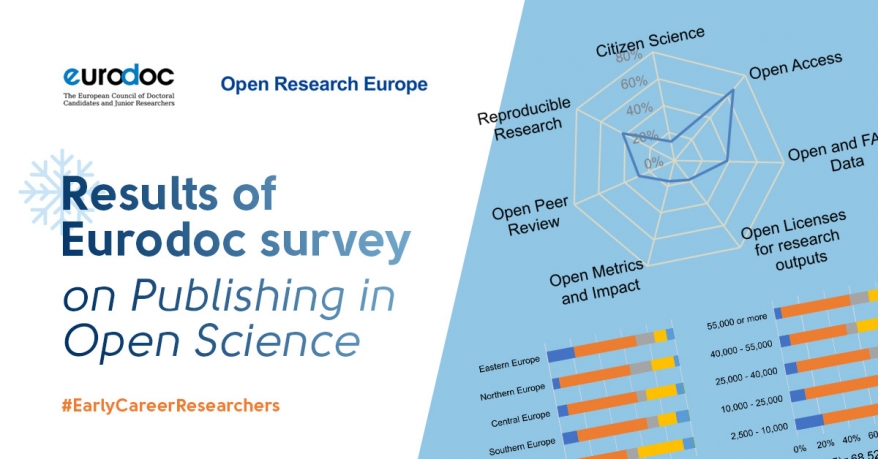In March 2021, the European Commission launched 'Open Research Europe' (ORE), an Open Access Publishing Platform for Horizon 2020 beneficiaries to support the Open Science (OS) practices, starting with Open Access publications. In 2020, Eurodoc, as an expert partner in the ORE project, conducted a survey on publishing in Open Science focused on early career researchers (ECRs) to formulate recommendations for ORE.
This survey sought to gain new perspectives on OS knowledge and motivation for its adoption amongst researchers, using a range of different dimensions relevant to demographics and background. An international team of volunteers analysed and summarised the survey results, which were published in Open Access on 22 December 2021, as a preprint on the F1000 Research platform together with the accompanying dataset.
The survey results suggest that the awareness and positive attitude regarding OS, specifically among ECRs, is high in Europe. However, there are significant career stage group differences in views and knowledge about OS. Generally, awareness and positive attitude tend to increase with increasing career seniority. Regarding European regions, there are three main groups sharing similar awareness levels and attitudes: researchers in Western Europe - the most informed group towards OS; researchers in northern, central, and southern Europe - a moderately informed group with some minor differences; and researchers in eastern Europe - the least informed group, whose opinions deviate the most.
The analysis indicates an "evolution of needs and focus" regarding scientific publishing: researchers in most European regions are in different stages of transition from the competitive to collaborative levels, while researchers in eastern Europe are largely beginning their transition to the competitive level.
| Basic level | Competitive level | Collaborative level | |
|---|---|---|---|
| Main need | access to basic quality research communication infrastructure | acceptance in prestigious publishing venues | access to open, rapid, and flexible publishing infrastructure |
| Focus on | participation | individual excellence | collaboration |
| Main success indicators | quantitative bibliometric indicators (e.g. number of publication in indexed international peer-reviewed journals) | qualitative bibliometric indicators (e.g. h-index, publications in journals with high impact factor) | impact of diverse research outputs inside academia (e.g. reuse of data set by others) and outside academia (e.g. findings used to guide societal decision making) |
Additionally, the lack of OS awareness and negative attitudes may have implications for suggested changes in the current scientific culture, which focuses more on quantitative metrics and outputs than on the quality and integrity of research. It is evident that OS practices are not yet integrated into research assessment procedures, thus constituting a burden rather than motivation for researchers, given the effort and time required for the research process.
Our study has clear implications for the design of OS implementation programs by focusing on training and introducing changes in the rewarding system through revising research assessment. Future studies should also monitor the researchers' approach to OS and science communication, given the debate raised during the COVID-19 pandemic about disseminating scientific outputs through social media, particularly in their early stages, i.e., through preprints and enrolling citizens and policy decision-makers in this process.
Link of the full article: https://f1000research.com/articles/10-1306/v1
Cite as: Berezko O, Medina LMP, Malaguarnera G et al. Perspectives on Open Science and Scholarly Publishing: a Survey Study Focusing on Early Career Researchers in Europe [version 1; peer review: awaiting peer review]. F1000Research 2021, 10:1306 (https://doi.org/10.12688/f1000research.74831.1)

